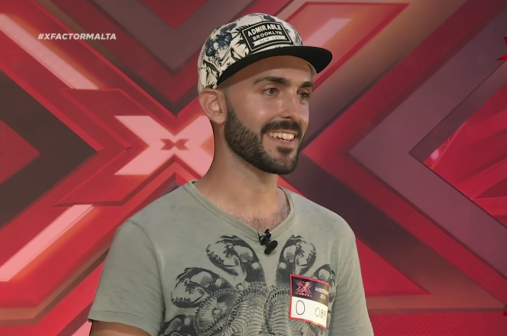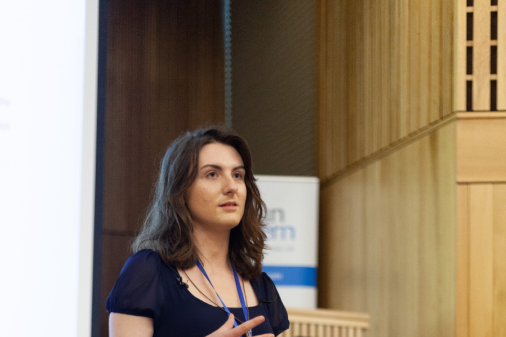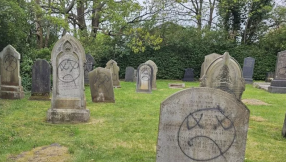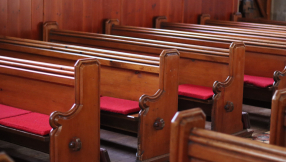
X-Outloud is a growing network across Europe of people who are no longer LGBT and a collection of their testimonies can be found in the ministry's new book.
The timing of the book is significant as the UK and other parts of the world seek to ban so-called conversion therapy, jeopardising along with it legitimate help for people struggling with unwanted same-sex attraction or gender dysphoria.
While the narrative has been dominated by stories of harm, X-Outloud's Matthew Grech, who used to be gay, and former trans Libby Littlewood say there are also many positive experiences of people overcoming same-sex attraction and gender dysphoria after receiving help.
They were involved in the creation of the new X-Outloud book and speak to Christian Today about why it's so important that ex-LGBT voices are heard too.
CT: There aren't many books giving the testimonies of ex-LGBT. Is that why you decided to put this together?
Matthew: We were inspired by a book in the US called "Changed", released by the Changed Movement. We felt very strongly that we need to be speaking about this and promoting and celebrating our testimonies in an extravagant way. And we think it's helpful to do that through a collection of stories in a book like this that brings together people from various European countries and a few other nations as well.
Libby: It's amazing that we have such a breadth of people, and the book is very relevant given the conversion therapy debate going on in the media, the political changes we are seeing, and even the backlash we are facing for posting on social media about our testimonies and Christian faith. That's normal, it's something we get a lot of, so it's really nice to have the book as a resource at a time like this. It features 44 amazing people and what's important about that is that it's very easy for people, politically, to de-personalise this whole issue and say we are attacking LGBT people. But this ignores the fact that there are people from a whole range of backgrounds who are ex-LGBT and this is our lives we're talking about. It's important that institutional leaders understand that.

CT: Matthew do you feel that the climate is hostile in Malta where you are?
Matthew: We have a different context because there is already a conversion therapy ban in place in Malta. In spite of this ban, I still get invited onto TV programmes to speak about the subject but what normally happens is that opponents tell the stations that they should not give me any airtime. Because, ultimately, what they really want to do is to cancel us. They don't want us to have the right to speak about our point of view. And that's very damaging because now most people are brainwashed to want to cancel those they disagree with. So opponents don't actually stand for freedom of speech. Somehow these laws have created a culture where freedom of speech is at stake and that is what is so troubling about all this. For example, I have disabled comments on my TikTok platform because of the negativity.
CT: Supporters of conversion therapy bans speak a lot about harm. What do you make of that?
Matthew: These days the thinking is: as long as you're not harming anyone we will accept you. So what the LGBT lobby is trying to do is to convince people that our message is damaging and harming because it could supposedly force LGBT people into the closet. But I would argue that the LGBT message is harmful and I think our role is to give reasons for that and explain why encouraging young people to take puberty blockers is damaging, and why not giving young people different options or points of view is so harmful. Because if we remove the freedom to choose, then they are going to think that their only choice is to accept something they potentially don't actually want to.
CT: What do you think of the suggestion that if we don't affirm people with LGBT feelings or identities they are at increased risk of commiting suicide?
Matthew: There are two different extremes. Somebody could be feeling suicidal because they have same-sex feelings, their parents are rejecting them, and they actually want to live as LGBT, and so they look for an affirming counsellor. But there is also the other same-sex attracted person who doesn't actually want these feelings, who thinks his values are more important than how he feels and wants to get rid of them because he actually wants to have a wife. We believe that this person deserves the right to look for help to achieve his own goals. They are not the therapist's goals but his own goals.
Imposing one view on people and expecting that everybody thinks the LGBT way is simply wrong and it's not the reality of what we are seeing in our ex-LGBT community. It also doesn't respect the Christian faith, which has its own views about homosexuality and transgenderism.
That is what is so concerning about all this. If you look at the Maltese law, for example, it dictates how we should think about this. It actually enforces a point of view and denies the reality that, for some, what they are experiencing may actually be a disorder. What does a disorder mean? It means that something happened in your life that affected your thinking about your identity and who you are. There's nothing evil about saying that. It's simply a recognition that life events do affect us on a psychological level and what happens to the psyche can affect the sexual development of a person.
So we need to be open to challenging ideas because if we don't create a culture where ideas can be challenged then that is very dangerous and we all know where that can lead.
CT: Libby, you were transgender for a while and then detransitioned so how do you feel about a conversion therapy ban coming into place and preventing someone who was in the same place as you from getting the help they want?

Libby: I think that, effectively, this has already happened. I was 12 when I discovered transgenderism and told my parents I was struggling with it. I actually didn't want to be transgender, I wanted a way out of the transgender lifestyle, but I was conflicted because I was being told by online sources that there is no way out, that's how you're born, that's who you are.
I was connected with a counsellor who seemed to see it as her goal to empower me to accept myself as transgender and so I was never given another worldview - this is what they call the 'wait and see' model. She would ask me things like 'have you decided on a name yet?' 'Have you tried chest binders?'.
The idea was to experiment and try out the different 'components' of transition so that I would then discover if I was really transgender or not. If I really was transgender then I would take hormones and keep going on that train. And if not, then it would be like we could step back and we wouldn't need to do anything. But what I actually needed was to explore why I had gender issues. That wasn't facilitated at all.
If you think about someone who has kidney disease, for example, they have the choice of a kidney transplant or dialysis. There may be reasons why they don't want the transplant and opt to stay on dialysis for the rest of their life but they make that decision based on knowing their options and the possible implications. The doctors recognise there are two pathways and help the patient to understand what these mean for them.
For me, the issue was approached as: you either have this or you don't and we'll decide if you have it or not based on what choice you make. The odd thing is that I wouldn't get any support or help if I decided not to make a physical or social transition and that I wasn't transgender. There was no one to say, ok, do you want to see what it's like to define yourself as a woman in a way that is not based on how you feel?
Nobody counselled me to help me realise that I am female and I don't see what's harmful about sitting in a room with someone like Mike Davidson [CEO of Core Issues Trust] and hearing them say you can be whatever you want and it doesn't affect what gender you are.
CT: Matthew, how do you think groups like Core Issues Trust will be able to operate if a conversion therapy ban comes into place in the UK? Will you still be able to give that kind of counselling support?
Matthew: From what I gather, the UK government doesn't want a strict conversion therapy law and so churches or non-affirming counsellors may still be able to operate but what I think will happen is that the LGBT lobby will try to shift the narrative to make us look like we're lawbreakers. This is what we're seeing in Malta.
The thing is that the LGBT lobby is very loud and they have a lot of platforms. And so, as they try to shift the narrative and make us look like lawbreakers, what happens then is that there are fewer and fewer journalists who want to talk about this issue because they feel afraid and intimidated and don't want persecution. And that's what's worrying. It's not just a question of whether Core Issues Trust will be able to operate but it's the culture that will be created through the ban itself that will make less room for tolerance and freedom of speech. That's why people in the UK need to be active in the consultation and in presenting their views to lawmakers.
CT: Feminists have been very vocal about protecting single-sex spaces and challenging puberty blockers, and some of them have had a horrible time with abuse and threats to their safety. Have you experienced anything like that?
Matthew: Malta gay rights campaigners claimed that some LGBT people were receiving testimony videos with the aim of trying to change their minds and they accused me of sending these videos. They were clearly twisting things as I never did that and they were encouraging people to report me to the police. So I challenged them on their Facebook page and in a TV debate asking for proof because it was unfair to me. More recently, when the story about me counselling a UK-based undercover reporter was published in the Sunday Mirror, they threatened to take action if it was found that I had broken the Maltese law.
So, they are very good at trying to intimidate us. They can't scare me because the Lord is my rock and even if I go through the fire, there is another in the fire with me. But they are freaking out the people out there who are looking at this whole thing and thinking, oh, we'd better not talk about conversion therapy, we'd better be affirming, we'd better not speak 'hatred'. That is sickening and needs to stop, and we're doing everything we can to make sure that this kind of intimidation does stop because it's not sustainable.
CT: Libby, do you feel this kind of self-censoring is happening in the UK? That people are too afraid to say what they really think and so are just keeping quiet?
Libby: I know so many people who are scared to speak out. There are people in my college who are really anxious about discussing their views - and I go to a Bible college, not even a secular university. People go to this Bible college to train in biblical theology and to be pastors. After I do a livestream talking about my views people contact me saying 'I don't know how you could do that, I'd be too scared'. Outside of X-Outloud, Core Issues Trust or Christian Concern, most people just don't talk about this because they're scared they might lose their friends or family.
Matthew: Some people I know removed me from their social media because they don't want to be publicly associated with me. The external pressure is real; there is a cost.
CT: There are some Christian ministries and advocates who identify as gay and same-sex attracted Christians and who advocate celibacy. But X-Outloud speaks about being ex-gay. What's your take on identifying as gay or same-sex attracted Christians?
Matthew: We believe we can support our view biblically, for example in 1 Corinthians 6:9-11, where Paul says that the sexually immoral and homosexuals will not inherit the Kingdom of God. And he writes "and such were some of you".
"But you were washed, but you were sanctified, but you were justified in the name of the Lord Jesus and by the Spirit of our God."
The New Testament teaching is that homosexuality for the believer is something of the past. We were that but our position now is that of having been washed, justified and sanctified. So the 'ex' is in complete alignment with New Testament teaching and it's important to speak the truth because we are a new creation in Christ and our feelings need to line up with the reality of this 'ex' narrative, that we 'were'.
Libby: To me it comes as a semantic differentiation. For gay Christians there is the understanding that homosexual practices are wrong; it is the action that is a sin. When I am speaking publicly on this, I like to differentiate that the action is a sin while the feeling we feel is our sinful nature and our brokenness. It's not something to feel ashamed of but it's also not something God wants us to act on.
But when I say it's a semantic argument then the connotation can be: oh well, then it's not important. But on the contrary our words are powerful. In Genesis 1, when God creates the world, He speaks everything out into existence. We're made in the image of God and we have the power of speech. In fact, there's so much in the Bible about words. We're told we shouldn't use our words to hurt others. Even in the Gospel of John, Jesus is introduced as the word of God and the word that was with God for eternity.
So our words have power. Even thinking about this issue of pronouns, people are asking: what pronouns should we use for people? But when you use the wrong pronoun you are affirming that this person is the wrong gender. When you use 'she' for a man then you are affirming that this person is actually a woman. But that is a verbal curse; it's like witchcraft in the modern age, because you are telling somebody they're something they're not.
So the moment you speak over yourself 'I am gay and Christian and don't have to act on it', you've just reinforced your gay feelings, you've given yourself an identity and label and effectively spoken a curse over yourself. Whereas if you say 'I am a Christian', 'I am ex-LGBT', 'I am not that anymore', that in itself is therapeutic when you're trying to leave that lifestyle behind.
The moment I can actually stand in front of the mirror and say I am not transgender anymore, I am female, I am not just a transgender person who's decided not to live in that lifestyle anymore but I am actually female, that's powerful. If you take that away, you're weakening yourself and your own argument and your own therapy.
Matthew: What is so special about Romans 1 is that it speaks about the feelings and describes same-sex attraction as "vile passions" and something "unnatural" that leads to shameful behaviour for which we receive the penalty that was due. This is very strong language. And so, yes, we differentiate between the behaviour and the attraction but we also believe people should receive help to overcome this attraction because Romans 1 is very clear about how God looks at these passions, which are essentially of the carnal nature.
And that's why can't just say, oh, God loves you. And we also cannot say that this passion is good, because Romans 1 is clear about this. So we feel grieved when Christian ministries empower this gay Christian narrative because it doesn't speak of the new identity in Christ and potentially even affirms feelings that God calls vile and unnatural. And this does not honour the Gospel of Jesus Christ.
I believe there is a way to speak of these attractions for what they are, while also displaying and conveying the immense mercy God has for people struggling with these issues. It's possible to be in a place where you don't accept these feelings as good and healthy, while at the same time are imparting the love of Jesus to people who are struggling. Because Jesus is the merciful high priest who became like one of us and that is the place to be in terms of communicating this.
CT: You are asking people who buy the book to donate a copy to MPs. What do you hope MPs take away from your book?
Libby: The most important is that we are human, we exist. We have our lives and our autonomy. A lot of infantilising goes on when it comes to ex-LGBT people who are seeking help. But they need to know we're not being manipulated. We are living the lives that we have and we are unique. Our book contains 44 different testimonies and each person had a different journey to come to the conclusion that this is not what Christ wants for us and that Christ wants something else for us than LGBT identities. Each of us has different explanations as to how we came to this point. We are not 'one size fits all' and not everybody who is ex-LGBT has come from a conservative background. Our book shows that diversity, that we exist, and we are not manipulated children. We should have our autonomy and the right to make our own decisions.
Matthew: MPs need to have compassion for the people struggling with this; the woman who was sexually abused when she was younger and is now married with children but who experiences conflict or mixed attractions and wants to resolve these. She deserves the right to find help to save her marriage and honour her relationship with her husband. Or the Christian who tries so much to be in a good place with God so they can have a clear conscience. Nobody should tell them their faith is wrong or impose their views on someone who has chosen to follow Jesus.
Who is going to have compassion on these people when they can't look for help because the government says no? That's horrible. We claim to be so big about equality but I don't see any equality in a ban on conversion therapy. We pride ourselves in equality but it's really only equality for some. And equality that is only there for some is no equality at all.
We want the MPs to connect with the realities of our stories and that's what this book achieves. It draws them into reality and what that looks like for us; that as we move away from these feelings and behaviours this is where our joy and mental health thrives. They need to give us the benefit of the doubt that we're not fraudsters deceiving ourselves as they like to claim.
Libby: The other thing to say is that there can be this dichotomy of liberal LGBT people and secular liberal Christians on the one hand, and groups like X-Outloud and conservative Christians on the other, and what's often forgotten is the extreme right - which we're often accused of being even though we're not. We actually stand up against that kind of extremism that tells gay people they're going to hell and advocates violence against them. We are actually saying to them: we accept you exactly as you are. But at the same time, there is a way out. If we didn't have our book out there and our testimonies and livestreams, who's going to tell the Church that there are people in your congregations struggling with this that you need to show compassion and love to?
Matthew: There are many in the Church who are having a very lonely struggle with these feelings or behaviours. Sometimes homosexuality might be addressed from the pulpit - if it's addressed at all - but it's not enough for these Christians to simply know what is right and wrong. It's like, thank you for telling me it's wrong, that's great, but what do I do with these feelings?
There are some things that are a journey and where are they going to receive the knowledge and insight from to receive their breakthrough? They need a lot of support and my journey was similar because for many years I tried to figure this out myself and I decided that I would be alone all my life without a wife or family of my own. But really, I was justifying my decision because I didn't see any hope in any other way from this, until I discovered all of these ex-LGBT ministries through Core Issues Trust.
When I dived into this world I could understand myself so much better and I opened myself to more transformation and change. I am now much more secure in my identity and can now see the potential of having a wife and children that I never dreamt of before because if there's no hope, then there's no dreaming. Ultimately our hope is in Jesus and He is faithful to lead us into a spacious place of abundance.













